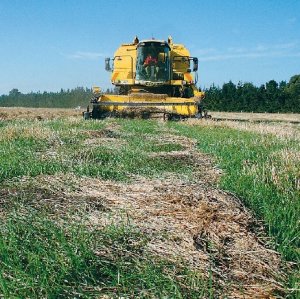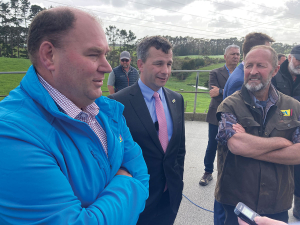Many have had crops lying in swaths for over a month with seed beaten out by heavy rains and in some cases, hail.
Late last week long-range forecasts held little hope of reprieve with rain, dull days and low temperatures the order of the day to at least mid-March.
Federated Farmers Herbage Seed section chairman, Hugh Wigley, says he averaged just two days’ harvesting per week in February on his farm near Waimate, South Canterbury.
“It’s the same with everyone I talk to. It’s just unheard of to be still trying to do large areas of ryegrass at the end of February.”
The problem’s been exacerbated by late-flowering European cultivars grown for re-multiplication and “quick turnaround” for Northern Hemisphere use.
“It’s not helping the industry as whole.”
Nick Tayler, who crops 600ha north of Timaru, expects yield losses of 30-40% in the 50ha of ryegrass he still has to harvest.
“Fortunately we’ve already done 120ha. Early crops yielded well but we’re taking heavy losses in later-maturing European varieties, some of which had to be undercut. Over-all it’s a very average grass-seed harvest.”
Valetta farmer, David Clark, says mid Canterbury ryegrass crops looked magnificent in January but those harvested before the season turned sour still failed to deliver the promised bounty.
Cloudy, wet weather when crops were pollinating could account for the poor seed-set, empty glumes and resultant high dressing losses, he says.
Germination and seed loss are of concern in crops yet to be harvested. While seed-extraction is difficult in wet crops, having to leave windrows for a long time to dry out results in losses from seed shatter.
After weeks of weathering, ryegrass straw - typically baled behind the combine harvester for sale to livestock farmers - is more suited to burning than baling, he adds.
Cropmark Seeds Ltd sales manager, Brent Stirling, says the late grass harvest is impacting on New Zealand’s ability to supply autumn markets such as Australia. “Companies which can’t supply seed within the next few weeks could miss out on a complete year’s sales,” he says.
“Some have sufficient stock to get them into the season but most top-performing novel-endophyte varieties sold out at the end of last year. Unfortunately these tend to be late-flowering perennials which this year, are still on the ground or only half-harvested. Pastoral farmers could find domestic supply short this year.”
Stirling says early-sown annuals yielded well and should be in good supply. Seed quality is good.
Some seed companies increased production area this autumn and may revise the acreage again in light of low yields this harvest, he says.
Stirling says harvest delays will impact on growers’ ability to drill new crops on time. Wet conditions would favour slug populations which in turn would adversely affect crop establishment. “We desperately need 10 days of good nor’west weather,” he says.









